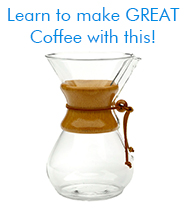Coffee Body vs Flavor Clarity
This past weekend I was reading a great book called "Everything but Espresso" by Scott Rao. It goes into detail about coffee brewing chemistry and professional techniques. If you find the science and chemistry behind brewing coffee interesting it is worth checking the book out.
In the book the concept of body vs flavor clarity is brought up along with a simple experiment/demonstration to experience and understand body and flavor clarity.
First lets start with the concepts behind body and flavor clarity book
What is Coffee Body?
Body is the mouthfeel of the coffee. Insoluble materials such as oils and fines that are suspended in the coffee are contributors to body.
In practice the feeling of oiliness or heaviness in the mouth is the coffee body. It is that rich full feeling at the back of the palate. Body tends to increase in the darker roasts and in brewing methods that have wire or coarser filtration.
What is Flavor Clarity?
What factors contribute to the balance between body and flavor clarity?
Our Experiment
The idea from Scott's book is to brew the same coffee using three different methods so you can see how the brewing method effects the body and flavor clarity.
Gear
Here is all the gear we used for the experiment. Most of it is fairlyy recognizable. I do want to point out, while we used a chemex we did not use a chemex filter. I was looking for an easy way to filter the french press brew and saw the chemex sittting on the counter and found my solution.

from left to right (as best we can)
- Bonavita Variable Temp Kettle - heats the water to be used in the french press
- Hello Kitty Mug - the mug I was drinking coffee out of during the experiment
- Bodum French Press - nothing fancy but it gets the job done
- Barataza Vario Grinder - Grinding up the coffee beans very accurate
- Chemex - we used a standard drip filter, this was an easy way to filter the french press brew
- Bonavita Brewer - makes a great and very consistent cup of autodrip coffee
- (3) 5.5 oz "rocks" glasses - a great size glass for evaluating coffee
Three Methods of Brewing
As mentioned before we brewed the same beans at the same grind setting in a french press, then filted half of the french press coffee through a autodrip filter, and autodrip. Here you see each coffee sample next to the device used to brew the coffee.

Close shot of the French Press and the coffee created from it.

Next up is the french press brew that was passed through an autodrip filter. We used an autodrip filter and a chemex to accomplish this.

Finaly we used a bonavita autodrip machine to create the autodrip sample.

Coffee Translucency
One of the big factors in the body vs flavor clarity continum is the amount of suspended solids.
Here are all three coffees with the light behind them. French press is on the left, then filtered french press, then autodrip on the right.

French Press close up. Here you can see that the french press sample is cloudier than the others. French press brewing lets through many more oils and suspended solids that are allowed to pass through the pourouss metal filter.

Filtered French Press. Here you can see that this sample lets a little more light through. Many of the suspended particles were filtered out when the french press brew passes through the paper autodrip filter.

Auto Drip. This sample has the fewest suspended solids of all. This is due to both the paper filter and the ground coffee keeping the small particles from making it into the cup.

Surface
French Press Surface

Filtered French Press Surface

Autodrip surface

Bottom of glass
French Press Bottom of Glass

Filtered French Press Bottom of Glass

Autodrip bottom of Glass










